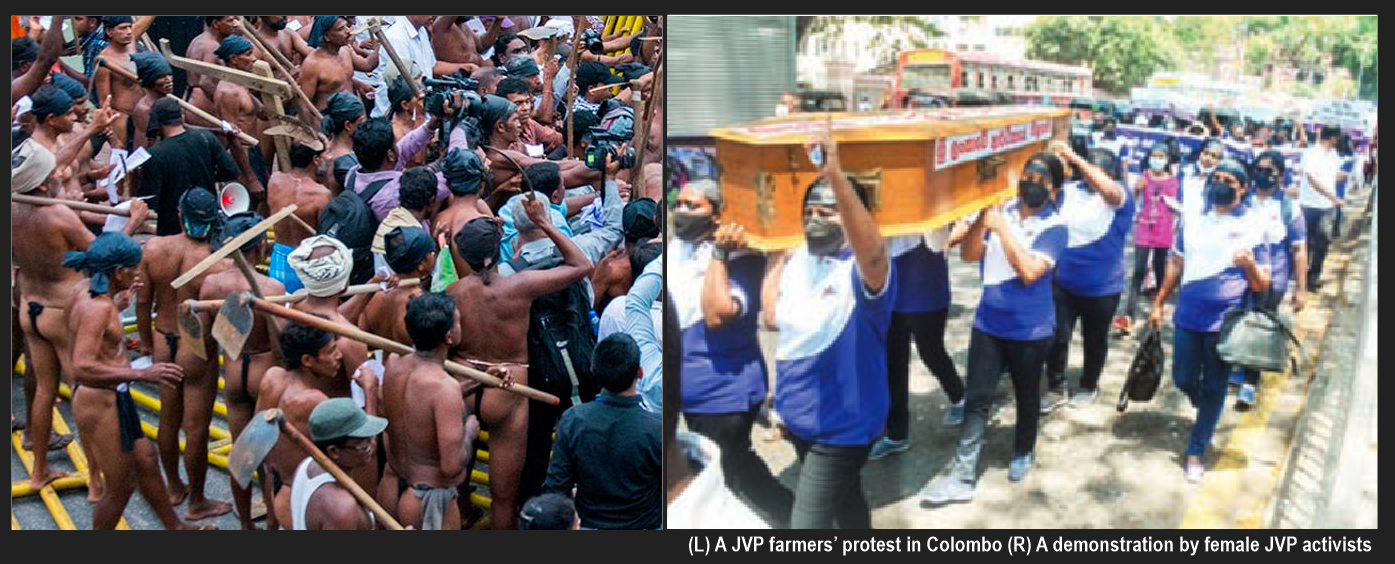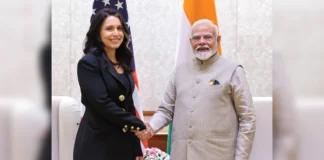The JVP has become the cynosure in political circles; it is scoring heavily by bashing the government mercilessly much to the glee of the irate public. A situation similar to that which existed in 2004 has apparently come about with the people being disillusioned and fed up with the main political parties—the SLPP, the SLFP, the SJB and the UNP. The yahapalana government (2015-2019) consisting mainly of the UNP and the SLFP became such a disaster that most people are now wary of considering the SLFP, the UNP and its offshoot, the SJB, as an alternative to the SLPP, which has failed to live up to their expectations. The JVP is trying to reinvent and repackage itself as an alternative to the incumbent government about 18 years ago
By the time of the 2004 general election, the UNP-led UNF government had ruined things for itself irrevocably; the then Prime Minister Ranil Wickremesinghe and the UNP had become hugely unpopular, and the people were also skeptical about the ability of the SLFP-led United People’s Freedom Alliance (UPFA), represented by the then President Chandrika Bandaranaike Kumaratunga, to deliver. The JVP made the most of the situation, and craftily used the SLFP to further its interests. Contesting as a constituent of the UPFA, it obtained as many as 39 seats in the parliament—the biggest achievement for a Marxist outfit in Sri Lankan politics. In Colombo, Gampaha and Kurunegala, JVP candidates, Wimal Weeraswansa, Vijitha Herath and Anura Kumara Dissanayake, respectively polled more preferential votes than the SLFP heavyweights. The JVP has got an opening again.
The current government’s approval ratings are decreasing rapidly, and according to Verite Research, they are now as low as 10%. The SLPP leaders do not seem to have wised up to the fact that they are losing ground on the political front; they do not care to mend their ways. They are apparently labouring under the delusion that the multiple crises the country is beset with are ephemeral and will resolve themselves with the passage of time, and they will be able to regain lost ground, as they have done in the past. True, they made a stunning comeback after their humiliating setback in 2015, but the situation is different today. The economy is on the verge of bankruptcy, and people are undergoing untold hardships with no hope of being relieved of the unbearable economic burden in the foreseeable future.
The US dollar is selling at Rs. 260 thanks to the recent devaluation of the rupee. The Lanka Indian Oil Company increased fuel prices again last Thursday, and the Ceylon Petroleum readily followed suit on Saturday. Wheat flour prices have shot up, and so have the prices of all imported commodities. Private bus owners, school vehicle operators, cab services and three-wheeler drivers have warned of massive fare hikes unless they are given a fuel subsidy. There are no signs of winding queues near filling stations, cooking gas sales points and milk food outlets going away anytime soon. It is widely believed that the worst is yet to come.
Reuters has reported that Finance Minister Basil Rajapaksa will leave for the US, next month, to attend an International Monetary Fund (IMF) meeting to negotiate a bailout package. The IMF help will come with tough conditions, the fulfillment of which will make the government even more unpopular due to their adverse political fallout. Rational economic policies and populist politics are mutually exclusive.
Opportunities and challenges
Both the UNP and the SJB have been demanding that IMF help be sought. So, the government is sure to apportion the blame for the aggravation of the people’s hardships resulting from the IMF conditions, to the UNP and the SJB. The JVP did not ask the government to seek IMF help. Nor has it offered any viable alternative; it has only come out with some suggestions that lack pragmatism, but it may be able to present itself as a pro-people party and muster enough popular support to improve its electoral performance.
The JVP however is not without problems. It is aging and losing its appeal to the youth owing to the dilution of its core revolutionary ideology and mystique, resulting from its long stay in parliamentary politics. Mainstream politics has had a mellowing effect on the JVP’s revolutionary outlook. The youth on whom the JVP is dependent to increase its numbers are becoming westernized all over the country due to their exposure to the rest of the world thanks to the availability of mobile phones, the expansion of traditional and new media, and rapid Internet penetration. So, the JVP has had to change its strategy to attract the youth.
Caught in politico-ideological duality
In the late 1980s, the main slogan the JVP coined to mobilize the rural youth—kolabata kiri, gamata kekiri [‘milk for Colombo and melon for the village’]—effectively highlighted the state’s glaring urban bias in resource allocation. It seems to have realized that this binary ideological format based on the urban-rural divide does not work well as modernity has made inroads into rural life and become a great leveler of sorts. It is therefore trying to expand its support base in urban areas while consolidating its power in the rural sector. Hence its farmers’ protests where its supporters are paraded in traditional loincloths in Colombo, and women’s and youth events where its activists are seen in modern attires such as denim jeans and T-shirts.
It is a high-wire act for the JVP to expand its vote bank to urban areas in a bid to improve its electoral performance and remain relevant in national politics as a Marxist party, while retaining its traditional, rural support base. Class resentment, rural-urban divide, cultural differences, caste-based discrimination, etc., are the socio-political factors that used to fuel the JVP’s political project. Its concentration on the urban sector and its attempts to give itself a new urbane look are likely to pose new challenges and lead to alienation of a section of traditional supporters.
Policy contradictions
The JVP’s strategy has come to be characterized by some policy contradictions over the years. It is experiencing difficulties in positioning itself on the political spectrum. It came into being, claiming to be a revolutionary alternative to both the UNP and the SLFP, and its strategy, as spelt out by its founder leader Rohana Wijeweera in its ‘five lectures’, which the outfit used to indoctrinate new recruits, was to elbow out the SLFP from national politics, challenge the UNP politically or otherwise, and capture state power. It also sought to oust democratically-elected governments led by both the SLFP and the UNP through violent means in 1971 and in the late 1980s, albeit in vain.
In 2004, Mahinda Rajapaksa, as the Opposition Leader, opposed President Kumaratunga’s decision to form the UPFA with the JVP as a constituent to contest the general election in that year; he said the JVP would ‘swallow’ the SLFP during their political cohabitation. The JVP, as he had predicted, overshadowed the SLFP at the 2004 general election, but failed to get its act together thereafter; it pulled out from the UPFA government in a huff over President Kumaratunga’s effort to share tsunami relief with the LTTE instead of making the best use of the rare opportunity to make a difference in politics and create a lasting impression in the minds of people by way of a political investment. (The following year, Rajapaksa enlisted the JVP’s support to win the presidency!)
The JVP also acts out of expediency rather than principle. Under Wijeweera’s leadership, it rejected open market economic policies, lock, stock, and barrel, but the present-day JVP has come to terms with them for all practical purposes. It also unleashed mindless violence, in the late 1980s, in a bid to scuttle the 13th Amendment to the Constitution and sabotage the setting up of the Provincial Councils, which, it said, would lead to the division of the country along ethnic lines. But, subsequently the JVP had representation in the Provincial Councils, and the 20th Amendment Bill (not to be confused with the one which the present government passed to restore the President’s executive powers) it tabled in Parliament in May 2018, seeking to strengthen Sri Lankan democracy, did not call for the abolition of the 13th Amendment, which it once called the bane of the country!
The JVP no longer seeks to create a Marxist state, and this is a radical departure from its revolutionary cause, for the advancement of which it shed a lot of blood on two occasions. It will also not be able to live down its political honeymoon with the UNP-led yahapalana government from 2015 to 2019.
New Wijeweera factor
The JVP has had to contend with a new challenge. Its founder’s son, Uvindu Wijeweera, has entered active politics, having returned from Russia, where he studied political science. His father also received higher education in Russia before returning home to be a full-time revolutionary.
Uvindu is wooing young Sri Lankans and has been able to make his cause attractive to them. He has formed an organization called ‘Devani Parapura’ (Second Generation), and disclosed his intention to contest future elections. Like his father, he wants to engineer systemic changes to the state, but he has publicly announced that he will not resort to violence to achieve that end. He is trying to gain a foothold in national politics by casting the net wide; he has invited the progressive people in all political parties to join his organization. He has chosen to maintain a low profile unlike his father, who became the JVP in the end. He says he is building a brain trust consisting of brilliant Sri Lankan minds. He has declared that he would form a political party to contest future elections. It is too early to assess his political programme, but his success, if any, will be at the expense of the JVP rather than any other political party.
Uvindu is sure to eat into the JVP’s support base to a considerable extent, because his outfit is free from left-populist ideological baggage. This is a worrisome proposition for the JVP, which is planning to capitalize on the current political situation by presenting itself as a viable alternative to the main political parties. It will find a formidable contender in Uvindu.



 Logging you in...
Logging you in... Loading IntenseDebate Comments...
Loading IntenseDebate Comments...

